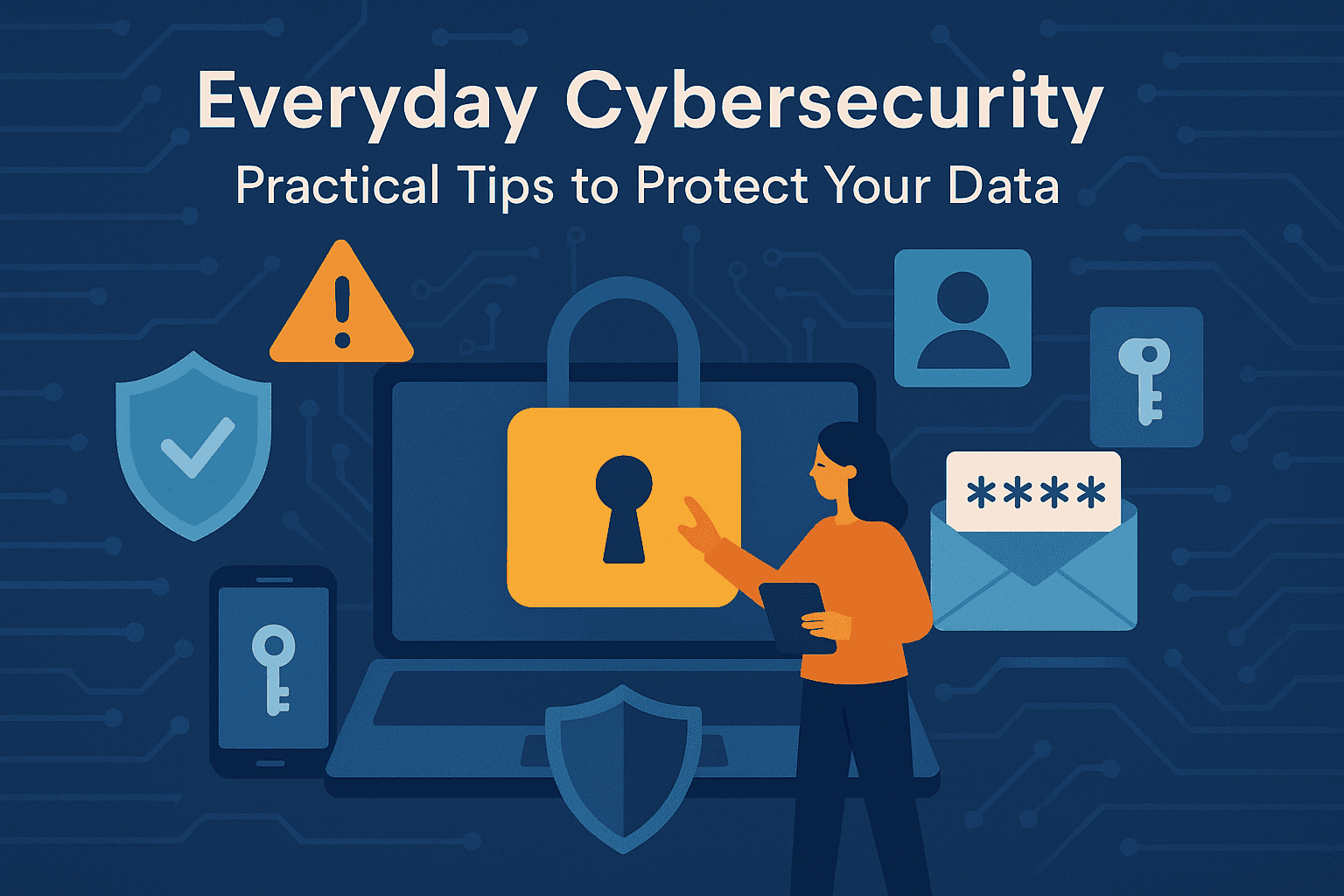Everyday Cybersecurity: Practical Tips to Protect Your Data

Hello to our DTByte community!
After demystifying Artificial Intelligence in our previous post, today we address a topic of vital importance in the current digital world: cybersecurity. With more and more aspects of our lives online, protecting our personal data and information has become a fundamental necessity.
We often think that cyberattacks only happen to large companies or public figures, but the reality is that any user connected to the internet can be a target. The good news is that, with some simple and conscious practices, we can significantly increase our digital security.
In this post, we will share practical and easy-to-implement tips to strengthen your daily cybersecurity. Join us on this journey to protect your digital life!
Why is Cybersecurity Important for You?
Your personal information (emails, passwords, banking details, photos, documents) has value, both for you and for malicious actors. A security incident can result in identity theft, financial losses, unauthorized access to your accounts, and damage to your digital reputation.
Cybersecurity is not just a concern for IT experts; it is a shared responsibility that starts with every user. Adopting secure online habits is your first line of defense.
Practical Cybersecurity Tips for Your Daily Life
Here are some key measures you can take right now:
1. Strong and Unique Passwords
- Don't reuse passwords: Using the same password for multiple services is like using the same key for your house, car, and office. If one is compromised, all of them are.
- Create robust passwords: Combine uppercase letters, lowercase letters, numbers, and symbols. Avoid easily guessed information (birth dates, pet names).
- Consider a password manager: These tools generate and securely store complex passwords, freeing you from having to remember them all.
2. Enable Two-Factor Authentication (2FA)
2FA adds an extra layer of security. In addition to your password, it requires a second verification method (a code sent to your phone, a fingerprint, etc.) to access your account. Always enable it when available.
3. Be Careful with Phishing
Phishing is an attempt to trick you into revealing sensitive information (passwords, credit card details) by impersonating a legitimate entity (your bank, a social network, an online store).
- Be suspicious of suspicious emails or messages: Look for grammatical errors, strange sender addresses, or urgent requests for personal information.
- Do not click on links or download attachments from untrusted sources. If in doubt, go directly to the official website of the entity in question.
4. Keep Your Software Updated
Software updates (operating systems, browsers, applications) often include important security patches that fix known vulnerabilities that cybercriminals could exploit. Enable automatic updates whenever possible.
5. Be Aware of Public Wi-Fi Networks
Free public Wi-Fi networks are often insecure. Avoid accessing sensitive information (online banking, shopping) when connected to them. If you need to, consider using a Virtual Private Network (VPN).
6. Back Up Your Data
Ransomware attacks (which encrypt your files and demand a ransom) or hardware failures can cause you to lose valuable information. Perform regular backups of your important files on an external drive or in the cloud.
7. Review Your App Permissions
On both mobile and computer, review what permissions you are granting to applications. Does a flashlight app really need access to your contacts or location?
Cybersecurity is a Continuous Process
The threat landscape is constantly changing. Staying informed about new scams and vulnerabilities is part of being a responsible digital user. Follow reliable sources of technology and security news.
In Conclusion
Protecting your digital life doesn't have to be complicated. Implementing these practical tips will put you in a much stronger position against online threats. At DTByte, we care about your security, and we hope this guide is very useful to you.
Cybersecurity is a journey, not a destination. Staying vigilant and applying good practices is key.
In future posts, we can delve deeper into more specific aspects of cybersecurity, such as social media protection or mobile device security.
Now we'd love to hear your opinion: Which of these tips seems most important to you or which one do you already apply in your daily life? Leave your comments below!